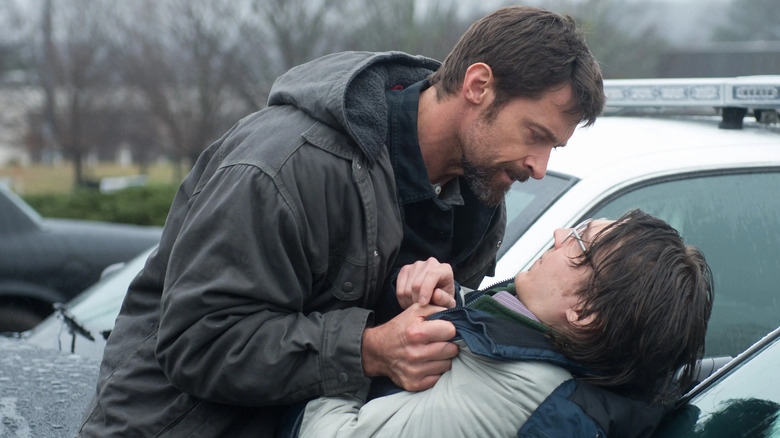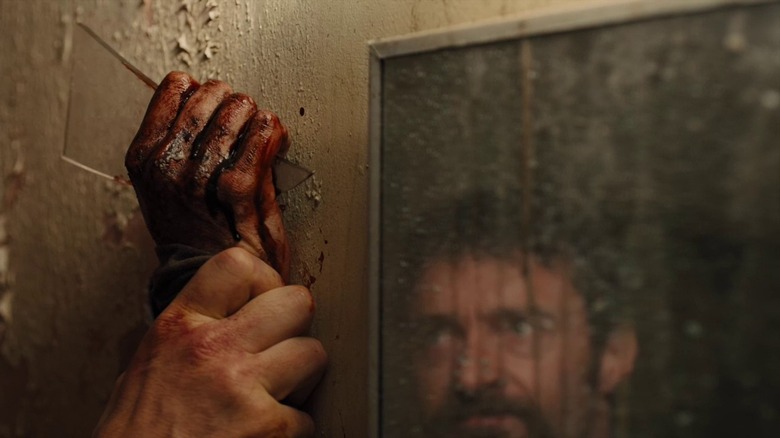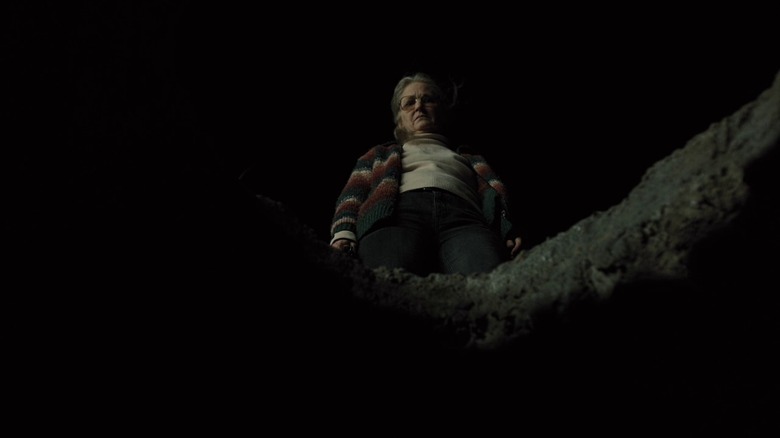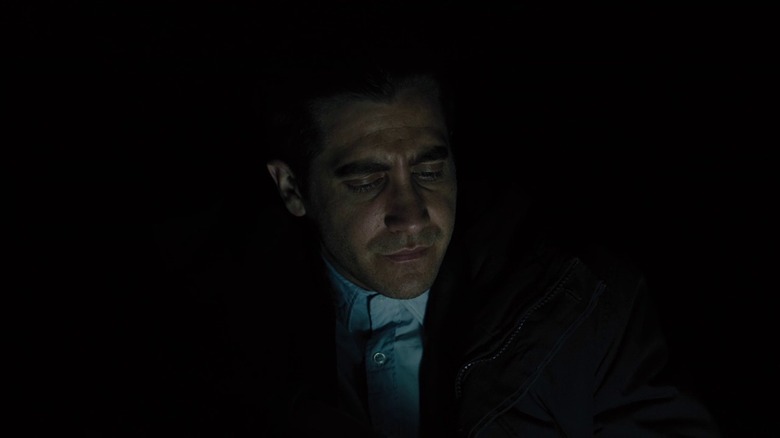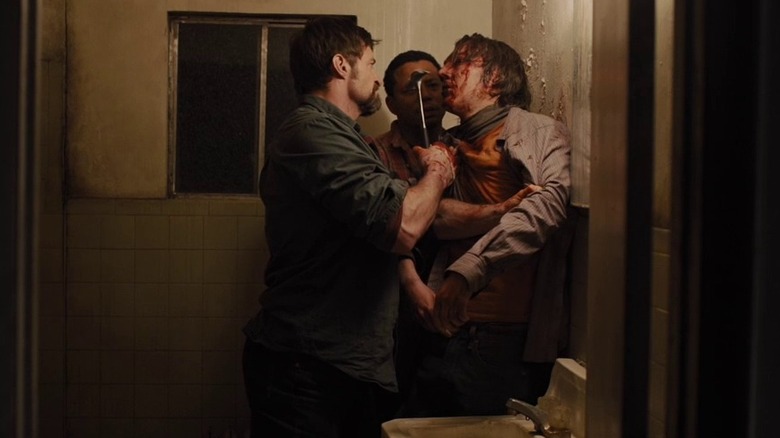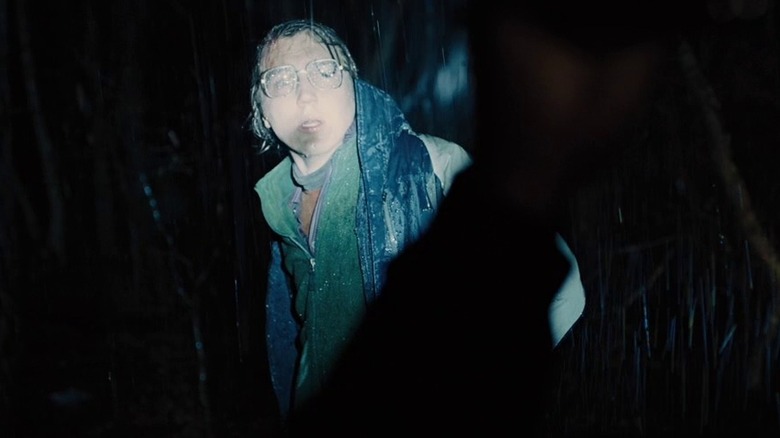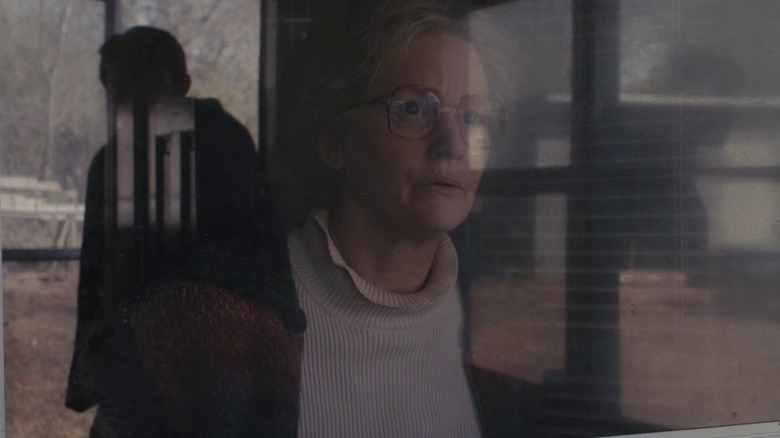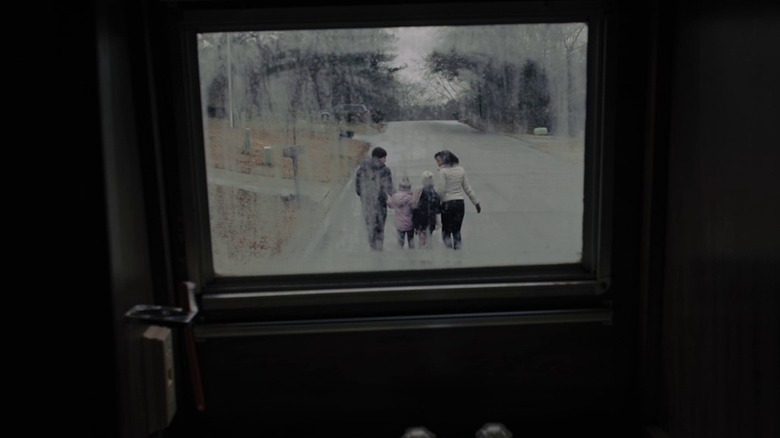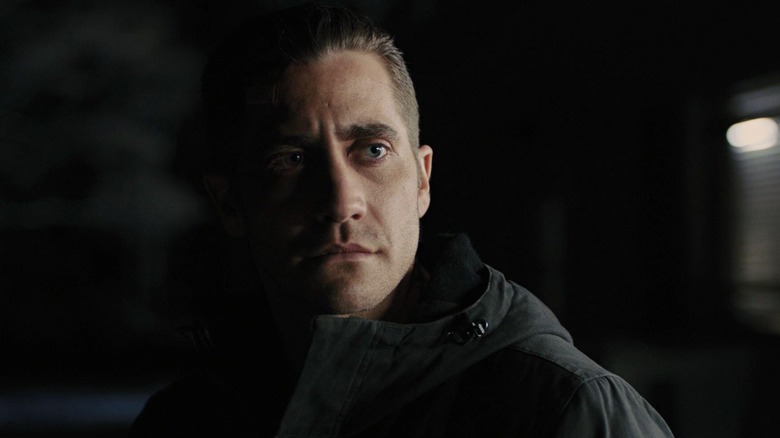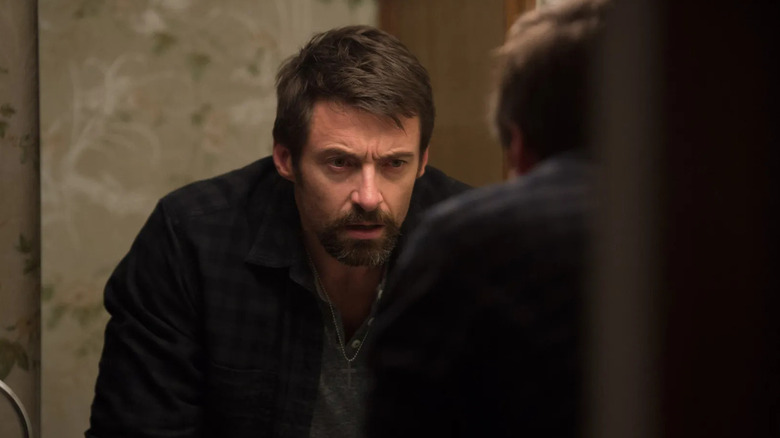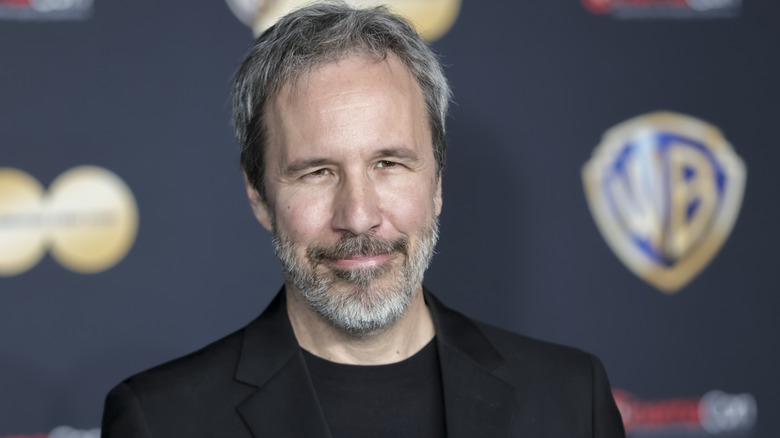The Ending Of Prisoners Explained
"Prisoners" is a 2013 thriller about the abduction of two young girls, a detective's frantic search to find them, and a father's tumble down the rabbit hole as he resorts to more and more extreme measures to force the answers out of the man he believes is responsible. The film stands out from others of its ilk by offering top-of-the-line thrills and suspense as well as placing a higher emphasis on theme and presenting a more nuanced moral quandary than the thriller genre is often home to.
With compelling performances, an excellent script, world-class, Oscar-nominated cinematography, and a director at the top of his game, it's no surprise that "Prisoners" landed on many best-of-the-year lists and worked its way into the top 250 highest-rated films of all time on IMDb. All of these accolades are made even more impressive by the fact that "Prisoners" was the first big-budget studio film from French-Canadian director Denis Villeneuve, who had earlier made indie gems like "Polytechnique" and "Incendies" and would go on to helm even bigger films like "Sicario" and "Dune." With "Prisoners" celebrating its 10th anniversary this year, it's the perfect time to look back at the plot of this complex crime thriller and unravel its mysterious ending.
What you need to remember about the plot of Prisoners
The main conflict of "Prisoners" concerns the abduction of two young girls — Anna and Joy — and the desperate search to get them back. The girls are friends and come from different families; the Dover and Birch families respectively. When the girls go missing, Detective Loki (Jake Gyllenhaal) is assigned to the case. The only lead he has at first is the suspicious RV that was parked on their street prior to the abduction. Loki tracks down the RV and finds that it is owned by Alex Jones (Paul Dano), who has the IQ of a child and whom the police conclude is innocent.
Keller Dover (Hugh Jackman), the father of one of the girls, takes matters into his own hands after Jones is released. While Loki pursues other leads, Keller takes Jones prisoner and tortures him for answers about the missing girls. It's unsuccessful, but Joy Birch turns up spontaneously, safe but unable to clearly remember anything that happened. With one of the girls saved but his own daughter still missing, Keller continues his outside-the-law search for answers. Meanwhile, Loki finds a corpse in the basement of a priest and questions a suspect, Bob Taylor (David Dastmalchian), who broke into both families' homes but played no role in the abduction.
"Prisoners" requires keen observation. While most mysteries and crime thriller plots frequently employ red herrings to obfuscate the true criminal(s) and their machinations, "Prisoners" largely resists that tendency. Every piece of information that Loki and Keller gather circles back around to the core plot, but some of the connections are more subtle than others, requiring some critical thinking to work out.
What happened at the end of Prisoners?
Keller and Loki both unravel the abduction in the end but they do so independently and through different methods. When he learns that Joy heard his voice while in captivity, Keller figures out that she was being held at the home of Holly Jones (Melissa Leo), the "aunt" of Alex Jones. When he confronts her, Holly comes clean on the abduction and the fact that she and her husband had abducted dozens of other children in the past. She then shoots Keller in the leg and forces him into a deep pit in her backyard hidden under a parked Trans Am car.
Loki figures out that Holly is the culprit through different means. The dead man he found in the priest's basement was killed because he admitted to murdering at least 16 children and planned on killing more. This corpse turns out to be Holly Jones's missing husband, which Loki susses out by matching his maze necklace to one of the mazes drawn by Bob Taylor, and both mazes match a photograph found in the Jones home. Loki catches Holly red-handed with Anna, and the two shoot at each other with Holly dying and Loki being wounded. He succeeds in rescuing Anna, but Keller remains in the pit, undiscovered. In the film's closing moments, Loki stands alone in the Jones' backyard when he hears a repeating whistle. The sound comes from Keller, who found his daughter's missing emergency whistle down in the pit. With a cut-to-black ending before Loki locates the source of the whistle, the ending remains slightly ambiguous in regard to Keller's fate while tying up all of the other loose ends.
Breaking down the ambiguity
By cutting to black in the final scene before Loki takes definitive action, the film avoids giving a concrete answer as to whether or not Keller survives. Though the film leaves it somewhat ambiguous, the true outcome is easy to determine. By this point in the film, viewers can be confident that Loki is a good enough investigator to figure out where the whistle is coming from, move the car, and get Keller out of the pit.
There is no question as to if Loki hears the whistle or not. He first brushes off the sound but then focuses intensely on it when the whistle repeats. The possibility of the sound being a coincidence is mitigated by the fact that Loki had a conversation with Keller's wife, Grace (Maria Bello), about the whistle earlier that same day. The odds of Loki identifying the sound of the rescue whistle and choosing to ignore it are just about 0%.
The whistle is one of the film's most prominent objects and one of the keys to understanding the full plot. From the very beginning of the film, the whistle is highlighted, and attention is brought to it multiple times throughout the film, making the faint sound heard by Loki at the end of the film just as impactful of a moment for the viewer without the need to ever show Keller blowing the whistle. Just as the film seems like it is about to conclude on a downer note, the whistle offers a ray of hope.
Does finding Keller even matter?
The ambiguity surrounding whether or not Keller will be found can be relatively easily cleared up, but there is a second layer of ambiguity that should be questioned: does finding Keller even matter? Keller goes from being an everyday family man to becoming essentially a violent criminal. He may have had compelling reasons for his actions, but Keller crosses many legal, moral, and ethical lines in his search for his daughter, namely his imprisonment and torture of a man who turned out to be innocent and a victim himself. For many viewers, Keller remains a likable protagonist whom they want to see survive through the end of the film, but for some, he's crossed a point of no return. Is Keller beyond redemption? Does his intended outcome justify the brutal means he uses to get there? These two nuanced questions color our perception of Keller's rescue.
The gunshot wound sustained by Keller before entering the pit is another variable that makes his potential survival even more ambiguous. After shooting him in the leg, Holly tells Keller that he "just might last 24 hours," if he manages to make a tourniquet down in the hole, which he does. In the timeline of the film, Loki kills Holly and rescues Anna later that same night. He stays overnight in the hospital and returns to the Jones house the following night. By the time the techies pack up and leave the crime scene, about 24 hours have transpired when Loki hears the whistle. Even if Loki does locate the exact source of the whistle and get Keller out of the hole in a timely manner, he could still bleed out before getting the necessary medical attention.
Who were Alex and Bob?
Two of the main suspects in the abduction case are Alex Jones and Bob Taylor. These two end up being innocent, but they are intrinsically linked to the case. Alex's RV was parked on the Dovers' street and he gave the girls a ride and spent time with them prior to their real abduction. Bob was guilty of breaking into the homes of both families and of stealing the girls' clothing, but he wasn't involved in the abduction itself and only sought to recreate the abductions to act out his twisted delusions.
Alex and Bob never share the screen in "Prisoners" but the two have a lot in common. Mentally, they are both essentially children in the bodies of fully grown men. They are each stunted from their times spent in captivity after being abducted as children. Alex and Bob were the first and second children abducted by Holly and her husband, and Alex remained in close proximity to Holly into adulthood. Bob's obsessions with mazes and snakes came directly from Holly's husband, who kept pet snakes and had a similar fixation with mazes and puzzles.
Neither Alex nor Bob has the mental or emotional intelligence to properly explain what happened to them or to prove their innocence when questioned as suspects under duress, but they are both victims just like Anna and Joy. Bob ended up committing suicide in the interrogation room, while a newspaper article reveals that Alex was eventually reunited with his real family, which also revealed his actual name to be Barry Milland.
What was Holly's motive?
Like many of the thriller film villains that came before her, Holly Jones eventually has a big reveal scene where she explains what she did and why, but unlike the bulk of her peers, Holly's motives are far more esoteric and symbolic than usual. Holly's reason for abducting children is tied to religion. Her objective is vocalized within the film as "Waging a war against God," which was the same sentiment imparted by her husband to the priest that eventually killed him.
The basic summary of her motive sounds crazy and completely impossible, but it is important to understand that she was not delusional enough to intend this as a literal war but rather a figurative, symbolic one. Waging a war against God, for Holly, took the form of shaking the faith of religious people. The best way she knew to destroy somebody's faith in God with absolute certainty was to abduct and sometimes murder their child; a senseless act of violence against an innocent person that religious people would be hard-pressed to find a reason for an all-powerful God to condone. Before his death, Holly's husband shared that same goal and may have been even more extreme in his ideological beliefs.
This war against God stemmed from the Jones couple's own loss of faith. They were once believers but had their worldview irrevocably altered by their own biological child's death. Their goal became to force others to question God's intentions and benevolence in the same way they were forced to.
Pray for the best, Prepare for the worst
In her book "I Know Why the Caged Bird Sings," Maya Angelou wrote, "Hoping for the best, prepared for the worst, and unsurprised by anything in between." A similar but shorter quote with a religious spin can be heard multiple times in "Prisoners," first spoken by Keller, then later repeated by Loki, "Pray for the best, prepare for the worst." The religious angle ties into Holly Jones's war against God and the overall commentary on religion being made by the film.
The quote also speaks to the mindset of the prepper community, which Keller counts himself a part of. From his basement full of survivalist supplies to the key emergency whistle that he gives his daughter, Keller is someone who considers himself prepared for the worst. The only problem is, Keller wasn't truly prepared for the worst. He was unprepared for his daughter to be abducted, and when the unimaginable happened, he spiraled out of control and did things he probably would have thought himself incapable of beforehand.
The "Pray for the best, prepare for the worst," quote also ties directly into the ambiguous ending of "Prisoners." The last time this quote is voiced aloud is by Loki in the film's final scene when speaking to the technicians who are working on digging up the backyard of the Jones home. The ambiguous cut-to-black ending without revealing Keller's fate allows the film to have it both ways and offer up hope without ruling out the worst outcome.
How did the script end?
The final cut of "Prisoners" ended differently than the original screenplay. There was still an element of ambiguity at play, though the closing moments unfolded differently, and there was more information provided to unravel the film's ending.
The film ends with Loki hearing the whistle and concludes with a lingering shot of his eyes searching the backyard for the whistle's point of origin. Without his gaze ever settling on the Trans Am, the film cuts to black. The script, on the other hand, ends with Loki explicitly identifying the Trans Am as the source of the whistle, or rather, the pit hidden beneath it. In the script, Loki seems to already be suspicious of the Trans Am even before Keller starts blowing the whistle, as he takes the time to examine its gutted interior before turning away, dissatisfied and still suspicious. After hearing the whistle, the script sticks with Loki a bit longer as he locates the origin of the sound and begins running toward the Trans Am before ending on a fade-to-black rather than a cut-to-black.
There is still some ambiguity at play as the script also ends before Keller is rescued, but there is even less reason to doubt that Loki eventually pulled him out of the pit with him actively en route. The script and finished film essentially end with the same intention, but the film concludes just one short beat earlier, making a major difference.
Prisoners' Alternate Ending
Even though the script and the released film have relatively similar endings, they were almost completely different. The ending that hit theaters wasn't the only ending that director Denis Villeneuve shot. The alternate ending of "Prisoners" didn't change much about the story but it did completely strip away the ambiguity.
Villeneuve was surprised by the amount of freedom that he was given by Warner Bros. on his first big studio movie. Nevertheless, there was a modicum of concern over the ambiguous ending with the studio fearing audiences may leave the theater on too much of a downer note if they thought Keller wasn't saved. Villeneuve shot an altered version of the ambiguous ending from the script but also shot a second ending that went a bit further.
The alternate ending of "Prisoners" extended the final scene further and explicitly showed Loki moving the Trans Am, finding Keller down in the pit, and helping him out of it. This extension gave "Prisoners" the unambiguously happy ending that Warner Bros. was looking for. But instead of running with it straight away, they decided to try out each ending on test audiences. Surprisingly, the test audience results showed that both endings worked about equally well. The studio allowed Villeneuve to pick which ending hit theaters, and he chose his original, ambiguous ending.
What have the cast and crew of Prisoners said about the ending?
When discussing the originally shot ending versus the alternate ending, it is clear that Villeneuve always preferred ending on an ambiguous note. It is also clear that the reality of what happened after the cut to black is that Loki rescued Keller from the pit as evidenced by the alternate ending being more of an extension, rather than any sort of narrative change.
The screenwriter, Aaron Guzikowski, was surprised that the studio let the ambiguous ending reach theaters. During an interview with Buzzfeed about the alternate ending, Guzikowski spoke on behalf of himself and the film's other creative leads when he said, "None of us really wanted to do that version, but we wanted to make sure we had it in case once the film was put together it seemed like it really needed it."
On the ambiguous ending, Guzikowski confirmed that Loki almost certainly rescued Keller from the pit, but, in his mind, there is a slight chance that he didn't. Interestingly, if Loki didn't save Keller, it would be by choice, not out of any failure to locate him. Guzikowski added, "I think there's a small percent chance that for some strange reason he might decide not to get the guy up."
